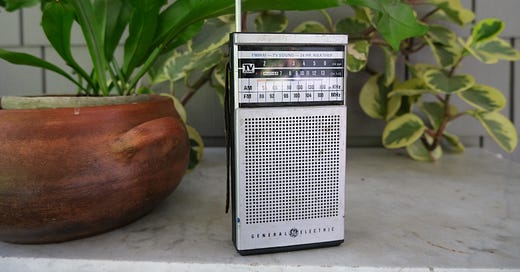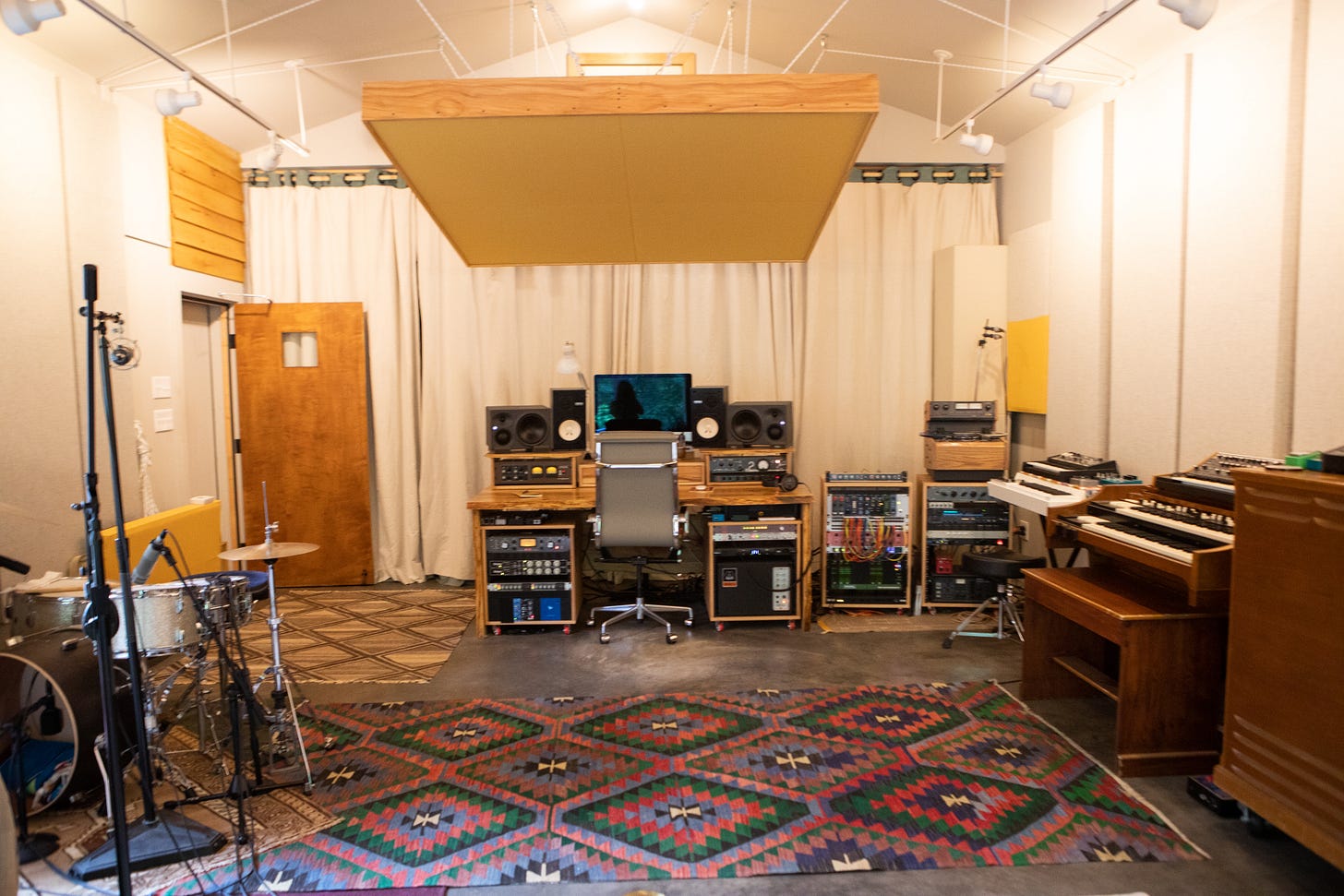The other day I had a conversation with a friend about sound quality. His main point was brief and unambiguous: I don’t care about sound quality. I’m not an audiophile. He loves music. He then challenged me to tell him why he should care about sound. I was a little dumbfounded in the way you can be when something you take as obvious clashes up against a worldview that renders it insignificant. His interest lies with the song, statement, musical information, energy, emotion. What difference does it make if that comes through the lowest resolution mp3 on YouTube played through a laptop speaker? Or if it was recorded with a phone mic? It could be phone-fi is as fit to spark transformation as the fanciest studio recordings.
Before going any further I want to acknowledge a few things. First, any definition of a sonic ideal (recorded or live) is hard to defend in the sense that it rests on subjective aesthetic values (i.e. you say this sounds terrible; I say it sounds terrific). That said, there are certainly historical norms in the music business and anyone working in live or recorded sound has to reckon with them. You may choose to chase a particular standard of excellence and to reject another, but the point is that there is an elephant in the room and it serves you well to acknowledge it. If you listen to recorded music from around the world, particularly anything of the popular variety, you’ll quickly realize that if these norms were once culturally relative then the globalization of the record business played a heavy role in their standardization. This is changing as technology enables a studio in your pocket. There is a great book by Jace Clayton called Uproot: Travels in 21st Century Music and Digital Culture that talks about various ways these norms are being challenged or sometimes disregarded. Still, the prevailing ideal of sound upholds the idea that quality matters. Norms around live sound remain more variable, having so much to do with social function, context, resources, and venue size, but we could still point to a loose set of ideals.
Second, I don’t consider myself an audiophile. I own a recording studio and I have worked as a professional musician for over two decades so I relate to sound through these filters. I’m not sure how this differentiates me from an audiophile exactly but maybe it has something to do with being an active participant in making the thing in addition to a recipient who listens to it. I am not an expert and I don’t care to defend my sonic ideal even though I have devoted much of my adult life to pursuing it. I spend many hours every week in front of high end speakers that deliver sound through similarly high grade digital to analog converters connected by cabling that costs more than I want to admit. My studio is heavily treated with acoustic panels, diffusers, and bass traps that we made in order to control the room reflections to the extent that the sound I’m recording or hearing out of the speakers is focused, balanced, clear, exciting, deep, wide.
It goes further. We have a McIntosh receiver on long-term loan in the house. It sounds phenomenal, similarly hi-fi to my studio set-up but emphasizing and revealing different characteristics in tone, detail, texture. Because I have a bit of a gear obsession on the studio side and these habits get expensive, I had never allowed myself to dig into the world of home hi-fi. But this loaner McIntosh has been life changing. One time I played a record on it for a musician friend who responded by saying, It sounds like the musicians are in the room. Exactly. And in this room no one is shouting over the music from the bar. Plus, I swear the upright bass has the weight and heft of a cargo ship and the drummer’s cymbal sounds like it could be a previously undiscovered ecosystem. I proof all of my mixes through this McIntosh and have had many small epiphanies and as much pure aesthetic appreciation listening to music through it.
I find live sound more erratic. When it’s right, as it often is in symphonic halls and sometimes can be in small or mid-sized concert venues, the potential for transformation is at hand. But then so many performances are ruined by their acoustics. I have made many a disappointing outing where I can’t access the music because it feels like a subwoofer has overtaken the room. As I reach to hear a human voice the more shrill aspects of the electric guitar tone slice at my ears like little thorns of a briar patch. Or the thud of the kick drum makes me wonder if my heart beat has somehow inverted, as all the room goes a thump thump. Performing live brings another set of challenges as we musicians on stage hear an entirely different balance/tone from how it sounds from the audience. If I can’t hear everyone in the band clearly or my instrument sounds harsh when performing then I suddenly feel adrift and alone in my own sonic life raft, some sad little dingy that seems to take on more water by the quarter note.
I feel so consumed by the certainty that sound quality matters that it’s hard for me to even begin to see how it might not. Of course I know we’re in an era when many listeners take in music through earbuds, phone and laptop speakers, or via the lowest possible digital file resolution online. And we’re in the era of fractured attention spans. But I have yet to accept the next logical step which poses a question that really drains the joy right out of my day… why bother with quality sound recording because it does not matter anyway? There was a time when sound quality mattered more, right? CD fidelity exceeds that of standard streaming. Vinyl quality can be terrific depending on the condition of all components involved. Cassettes, well…
Ok, so maybe not. But then why did it become so essential for anyone involved in the upper echelon of the recorded music business to dump not just tens of thousands but often hundreds of thousands of dollars into recording? Sure, some of this went toward well publicized extravagance but the cost of equipment, custom designed/built spaces to record in, and people who had the skill to put all of this together was (and is) no small investment. Plus the classical and old school jazz recordists also pursued sonic ideals, so we can’t just write this off as an embarrassment of show biz riches. But is all this just an ongoing arms race? Have folks in the music industry fooled themselves into thinking sound matters, dragging the rest of us along for the ride?
Despite what I wrote above about my love of fancy speakers, one of my favorite playback systems is an old transistor radio that I bought for $1 at an antique store in a roadside garage over a decade ago. It lends a softness, warmth, and pleasant compression to the sound of whatever FM radio station its current battery health and the foliage of the season allows us to beam in. The single speaker never overwhelms the space nor is it tinny and unnecessarily bright as so many phone speakers can be. This tells me that my reply to someone not caring about sound quality might not just have to do with the source.
The point is not that we all listen on elite grade sound systems or in symphonic halls. Like the studio speakers and the McIntosh, the transistor radio invites us to lean in. This little speaker becomes more than the sum of its parts when the sound waves coming through somehow light it up in way that allows me to access what feels like the transformative power of sound. So maybe it is not so much the sound quality that matters as the attention that we bring to it. Or maybe as we bring more attention to sound, we learn that its quality has everything to do with how we receive it.
A related poem…
Singing Forever
A bird sings overhead.
There are trees all around.
Who knows how long
it has been singing
or how different the song
might sound if the singer
had perched on another
branch, further from leaf
litter, the reflective rock.
I don't know the name
of this bird. I have an app
that would tell me if I reach
for the glowing phone,
but then would I hear
the way this single voice
sends waves over a wind
that swishes tree leaves
into maracas, brush strokes?
My breathing is contained
in a small room reverb
beneath skin and ribcage
alongside the rhythm of
this birdsong that moves
like blood, water, air.
In and out, up and down,
some wash, a little rush,
the small quiver.
An unnamed soloist shakes
loose of groaning car engines
and throaty jet noise long
enough to chirp past the
sea of noise that otherwise
keeps us from hearing it.
A bird sings overhead.
There are trees all around.
It has been singing forever. 





agree on all counts. fidelity of emotion is the thing, same as the sounds of nature